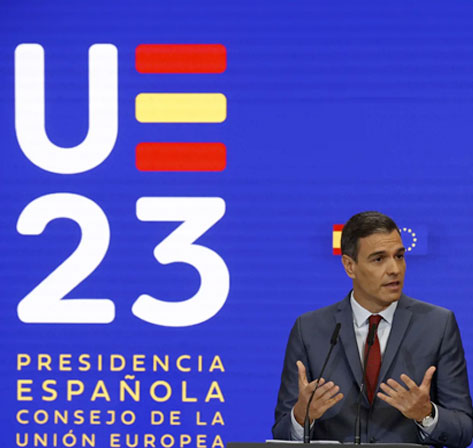July 2023
Americas Perspective on 2023 Spanish Presidency of the Council of the European Union
Region: Transatlantic Perspectives: Americas
Author: Julieta Gomez
Geopolitically, Spain has made it a priority to strengthen the relations between the EU and Latin America and the Caribbean (LAC), as both blocs share common interests and values that make cooperation between them and on the prioritized issues, relevant.
As of July 1, and until December 31, 2023, Spain will hold the presidency of the European Union (EU) for the fifth time. Spain announced that they will focus on the environment during their tenure. Specifically on the Nature Restoration Law, the fight against ocean pollution and the proliferation of microplastics and uncovering the potential of renewable energies. Geopolitically, Spain has made it a priority to strengthen the relations between the EU and Latin America and the Caribbean (LAC), as both blocs share common interests and values that make cooperation between them and on the prioritized issues, relevant.
The first event to mark the Spanish presidency was the recent celebration of the III Summit of Leaders of the European Union and the Community of Latin American and Caribbean States (EU-CELAC), which took place in Brussels on July 17th-18th. The previous summit took place in 2017, and since then, a total of twelve countries have presided the EU none of which have planned an EU-CELAC summit. Evidently, LAC has not been a priority to them, which confirms that the only European country to see the region’s relevance is Spain. As a result, Spain revived the summit, and part of it is perhaps due to the deficiencies and dependencies of the EU that have been made evident from the war in Ukraine. The potential of LAC in key areas such as lithium, rare earth and critical minerals, energy, and value chains will be necessary for the EU to successfully carry out their plans on climate change and the environment.
The current state of global affairs has opened a door for countries to redefine the world order. The war in Ukraine highlighted the EU’s dependence two critical issues: NATO for defense and Russia for energy. As a result, countries have realized that to be competitive in this ever-changing world, the dependence on “superpowers” like the US, Russia, and China is not sustainable thus opening the door for LAC’s resources.
Evidently, LAC can also benefit greatly from improved relationships with the EU as it is still one of the main trading partners for the region as a whole and in some cases the main one. Bilateral relations have always been positive, and cordial and the EU has supported LAC in many issues through the years like education, health, rural development, trade, and agriculture, among others. However, the bi-regional relationship has historically been more “charity-based”.
The hope in LAC is that the Spanish presidency of the EU will result in a new and robust bi-regional agenda to allow for a more collaborative approach to present and future needs on both sides of the Atlantic. Most importantly, that the EU puts aside the historically Eurocentric vision of the world and the relationship and understands LAC as an equal partner. A lot is a stake for LAC in this presidency and with Spain’s leadership and collaboration the region will be able to position itself on this changing order that is becoming more multipolar.
